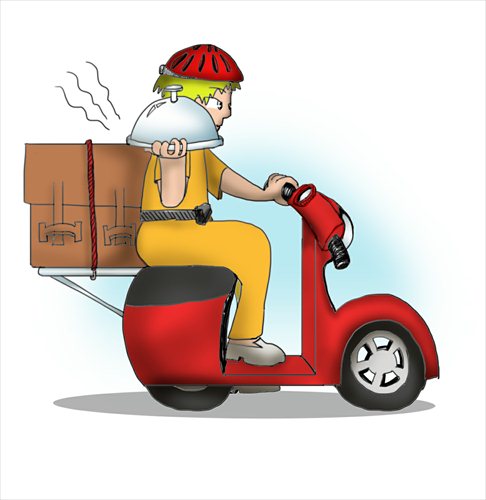
Illustration: Lu Ting/GT
With China's continuous development of mobile Internet and massive data technology, traditional Chinese catering enterprises are being heavily influenced by new digital platforms.
The combination of Internet and food is ostensibly the perfect recipe in China, where the only thing higher than the number of smartphone users are the number of foodies.
As such, O2O (online to offline) food delivery platforms have in just the past couple of years revolutionized Chinese consumption patterns, with students and white-collar employees comprising a majority of O2O users.
Ele.me.com, one of China's major food delivery platforms operating in over 700 cities, reached 1 million orders in October 2014, a milestone for the new platform. By December of 2015, the company had far exceeded its own expectations with 3.3 million orders; in May of this year those figures surpassed 5 million.
As a rather plump university student, I am admittedly addicted to online food ordering. Instead of having to cook my own meals in my dorm, or wasting time walking outside to the nearest stall or restaurant, I can simply swipe through the image-based menus on my smartphone apps to see what appeals to me at that moment, then wait for the delivery boy to come knocking.
However, my enthusiasm for O2O delivery has been disrupted. It was recently and widely reported in local and national media outlets that many O2O food businesses are using kitchens operating without any kind of business license or health certificate.
Their so-called food production facilities are reportedly just ordinary household kitchens run by amateurs, with many of them appallingly unsanitary. Cooks who don't wash their hands after using the toilet, dogs and cats and vermin crawling around the kitchens, expired or rotting food and rusty or unwashed utensils are all reportedly quite common scenes at O2O food delivery kitchens around the country.
I was shocked by these reports, but it all started to make sense after recalling the number of times I have suffered from diarrhea after eating an O2O meal.
Most recently, I ordered rice with crayfish from one of ele.me.com's many nameless restaurants. The pretty photo on the menu app made my mouth water. But just a few hours after eating my special delivery I had to rush to the toilet to make my own special delivery.
Though many online food delivery platforms claim to verify each of their restaurant's qualifications and licenses prior to allowing them on their platform, according to media investigations, many facilities can easily bypass these lax requirements.
Food safety is not the only issue. Without any business license, most of these illegitimate kitchens are also evading paying taxes. Sadly, it's very difficult for the central and local governments to monitor and control such unauthorized vendors.
Unlike unlicensed street stalls that are easily chased down, these online street stalls operate in a virtual grey zone that China still has not been able to effectively police.
Now that O2O food delivery has proven itself to be a multimillion-user platform with annual revenue set to reach in the billions, the Chinese government should make drafting regulatory laws in this industry a priority.
Equally vital, consumers should be more encouraged by O2O platforms to report any online kitchen suspected of being unlicensed or unsanitary, perhaps incentivizing them with a rewards system. The pile of poo emoji would probably be the most suitable.
There's pretty much nothing more important to humanity than our health. As history has shown us throughout the ages, diseases and viruses and illness could be spread among millions of people within a matter of days.
No country is impervious to a possible pandemic. And in China, where many food manufacturers have developed a horrible reputation for using dirty or even toxic ingredients, any Chinese F&B business should be under the strictest, most tightly supervised lens of regulatory authorities.


















































